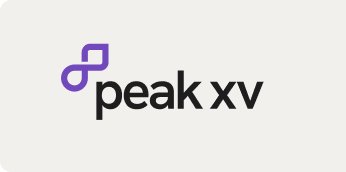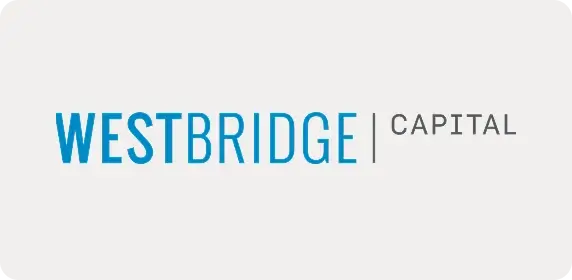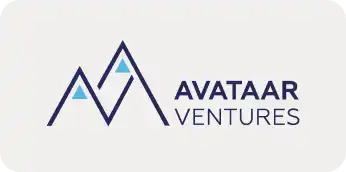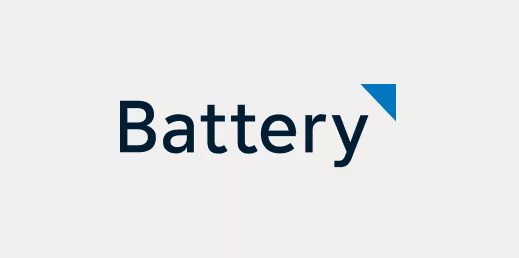Part of the Advantage India series: How Indian founders are building global AI solutions for underserved markets
While Silicon Valley debates the metaphysics of AGI (artificial general intelligence), a Bangalore-founded startup has built something more practical: AI that actually makes money for small businesses worldwide.
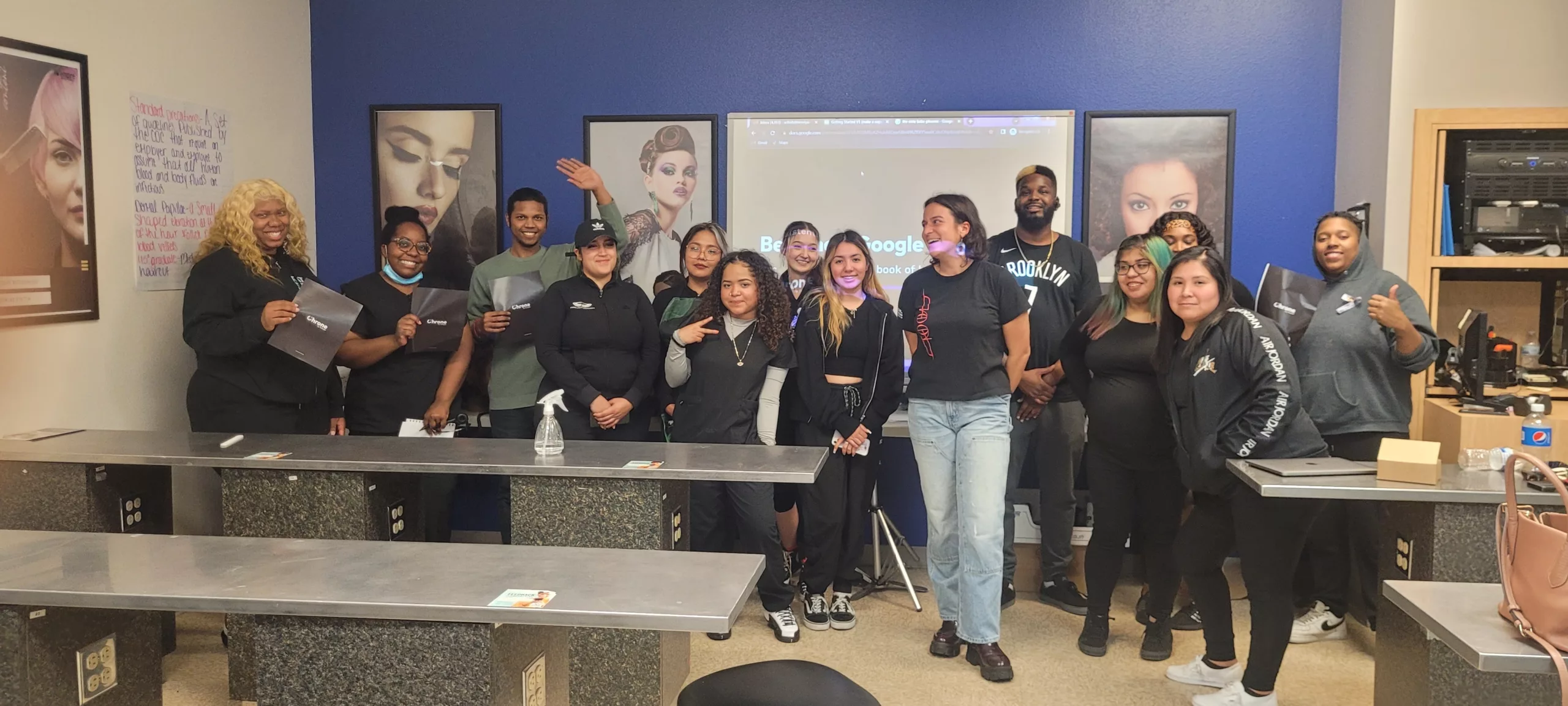
Zoca just raised $6 million to deploy AI agents across the global hyperlocal wellness sector, from neighborhood salons in Phoenix to spas in Mumbai.
The pitch sounds almost mundane: automated marketing for neighborhood salons, spas, and independent beauty professionals.
Look deeper, though, and you’ll find a company that sells AI outcomes instead of AI tools, a startup solving real problems for real money in an ecosystem that often treats revenue as an afterthought.
The timing of this pitch encapsulates a fascinating contradiction.
Fiverr’s recent survey of 6,000 small businesses across 25 countries reveals that 70% spend less than five hours weekly on sales and marketing, despite recognizing its critical importance. Meanwhile, AI marketing tools are projected to generate $47 billion in global revenues this year, climbing to $107 billion by 2028.
But there’s a twist – this massive AI marketing spend is largely going to enterprises that already dominate their markets, while the businesses that need it most remain excluded.
Zoca flips this playbook – its real innovation is economic accessibility.
The next wave of software will be agentic, vertical, and outcome-first, delivering results instead of just tools. Not just to large enterprises but to everyone, small or big.
The Dashboard Fallacy
Most SaaS companies assume their users want control, analytics, and the satisfying illusion of strategic oversight. They build dashboards like shrines to analytical complexity…then wonder why adoption rates crater after the first month.
Zoca took a different approach.
Their customers include professionals like Gail Aungst, co-owner of Phoenix-based Ohana Sun Tanning, who understands that “Google search is really important and keywords are critical” for her business. Then there’s Latasha Seawood, owner of Slay by Vashae, who experienced dramatic results: “The first 30 days of using Zoca, my business went from maybe 3-4 people a day, into a queue. I was forced to turn people away.”
These entrepreneurs are selling their time rather than products.
As founder Ashish Verma puts it: “Every empty chair is missed revenue they’ll never recover.”
They excel at their craft but have no interest in becoming digital marketers.
Zoca’s radical solution?
No dashboards. No “actionable insights.” No monthly strategy calls where consultants explain why engagement metrics improved while revenue stagnated.
The outcome is marketing automation with zero visible automation.
Technology that serves without demanding assimilation. Their AI operates like good infrastructure: invisible until its absence would be catastrophic.
This design philosophy challenges Silicon Valley’s fundamental bias toward complexity.
Many tech companies conflate sophistication with value, building features that demonstrate technical prowess rather than solving actual problems.
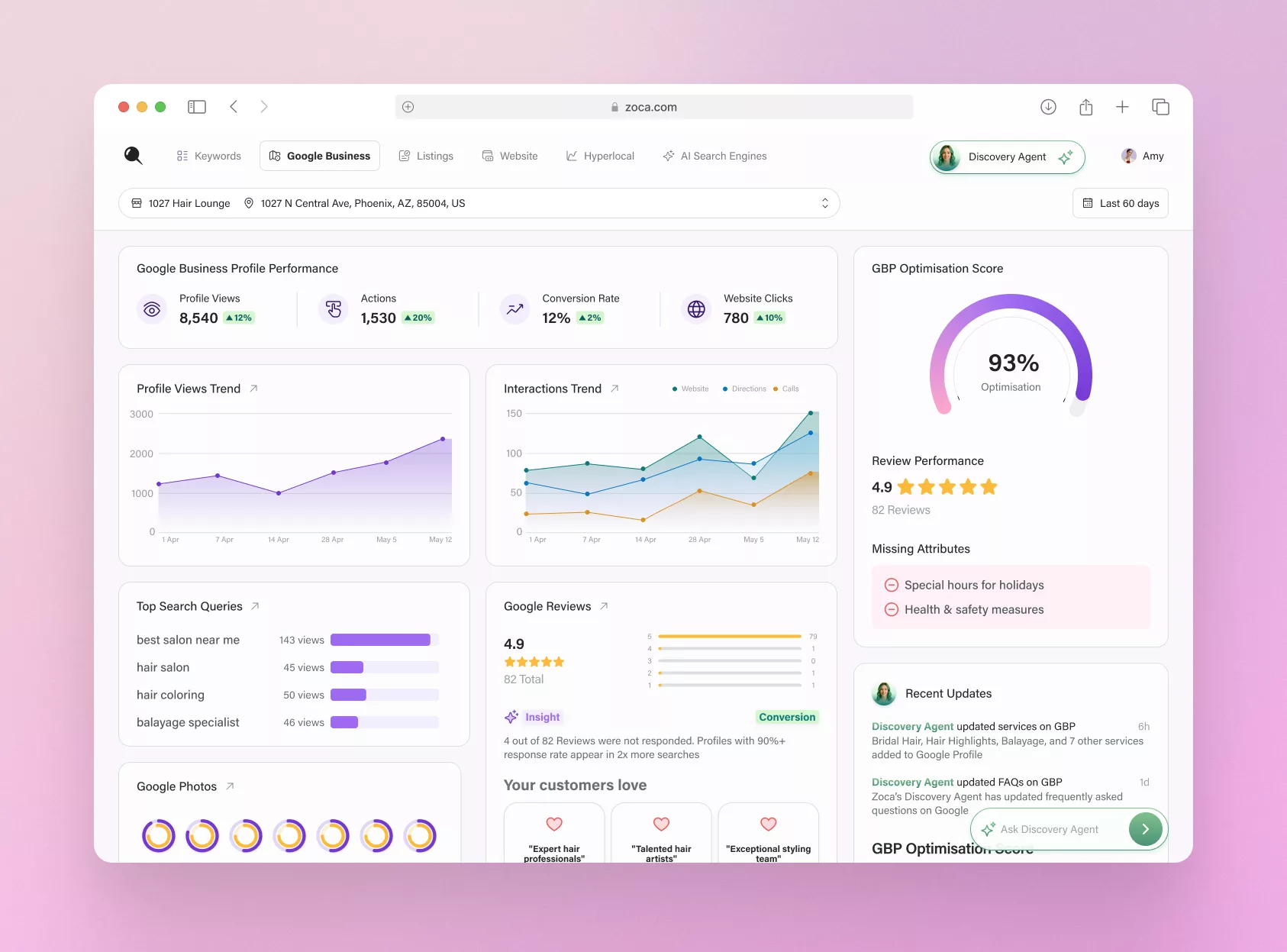
Zoca inverted this logic entirely. Their competitive advantage lies in what they choose not to build.
Intelligence at the Micro Level
The technical challenge here extends beyond building another ChatGPT wrapper.
Zoca’s AI must understand that hyperlocal businesses face unique constraints: they need maximum reach to customers searching for local services while having zero interest in appearing in search results for customers on the other side of the country.
A “glycolic facial” campaign in Bangalore requires different optimization than the same service in Baltimore.
Their hyperlocal intelligence engine processes booking patterns, search trends, and consumer intent data to optimize campaigns at remarkable granularity.
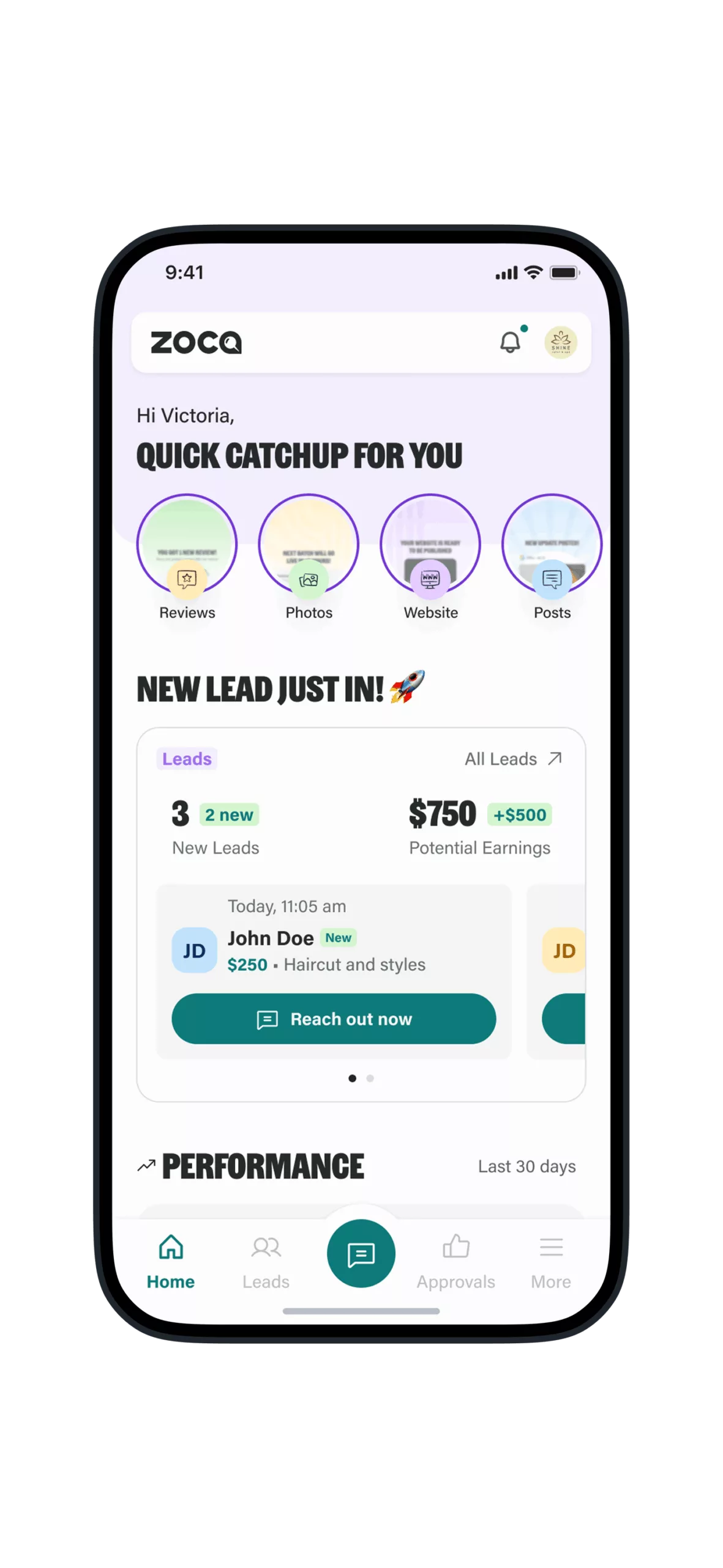
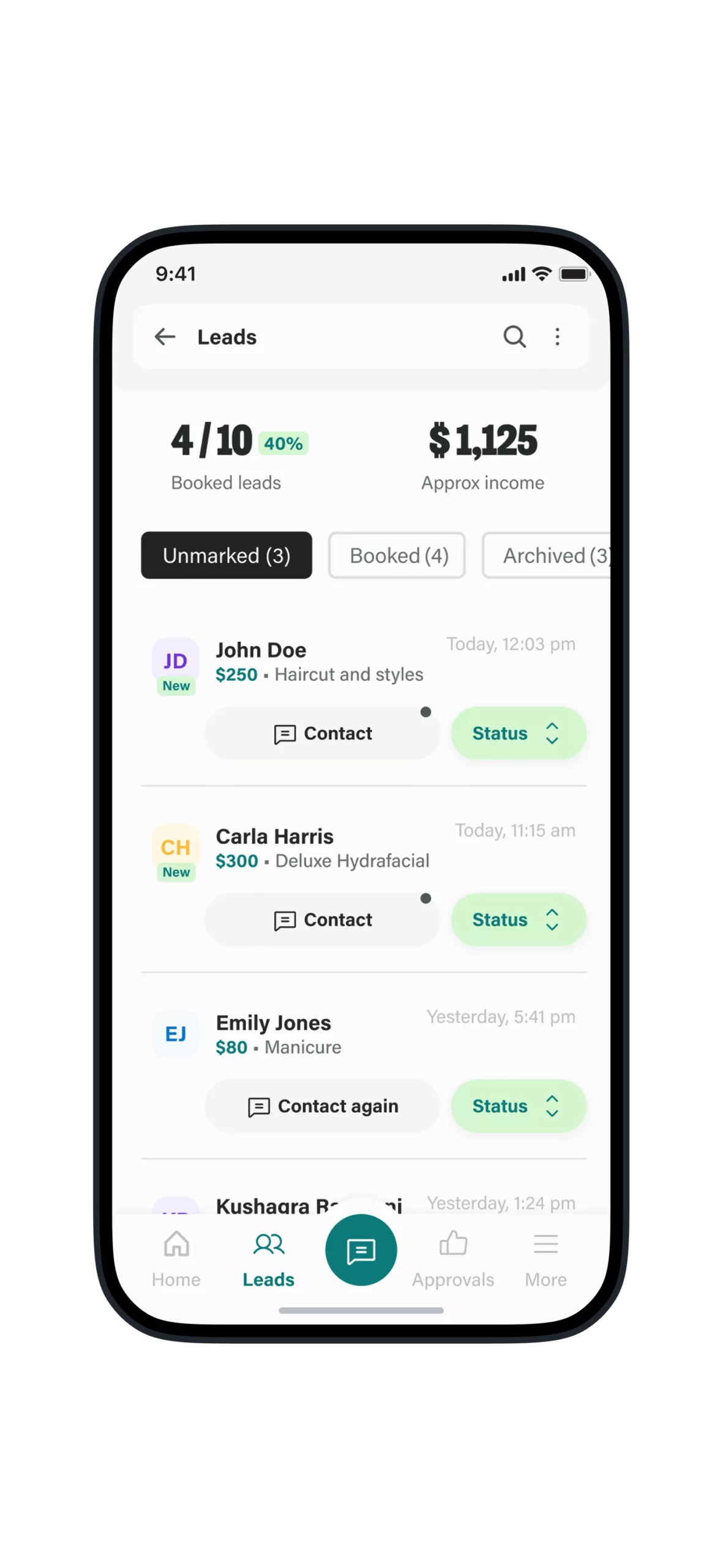
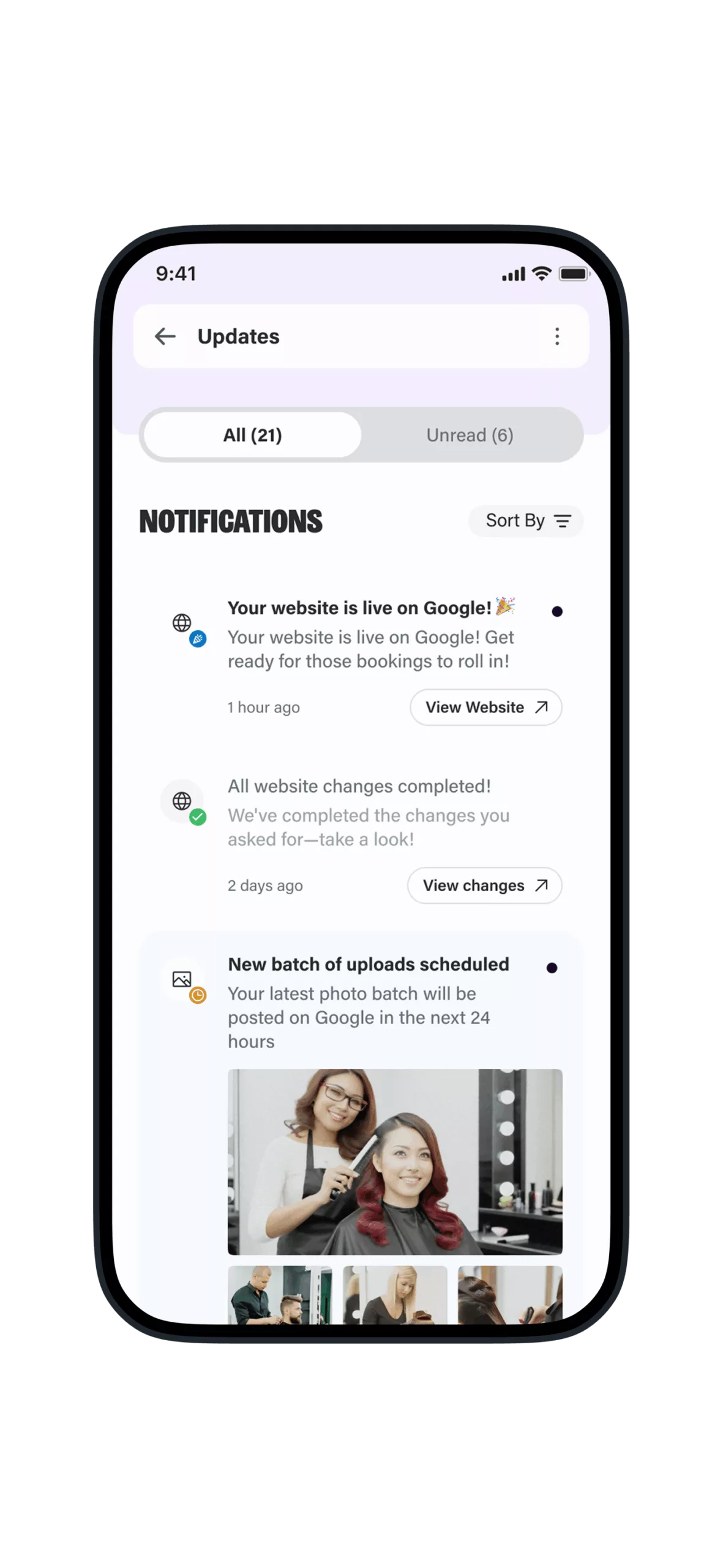
Each campaign generated by Zoca’s AI performs cultural translation across global markets.
The Global Economic Foundation
The global wellness and beauty services market represents a massive opportunity that transcends borders, but it’s part of a larger story.
For decades, the entire global local services market has been chronically underserved by technology. Small local businesses worldwide have been expected to juggle complex tools or hire expensive agencies just to stay visible and keep their appointment books full.
These aren’t just beauty salons. Local service businesses across the US alone represent over 7 million enterprises – the backbone of every neighborhood, from wellness studios to pet groomers.
These are high-skill professionals, deeply trusted by their communities, yet they’ve remained underserved by technology that can drive actual outcomes.
The real opportunity lies in understanding a fundamental shift: these businesses sell time, not products.
But most of them are forced to juggle a patchwork of tools or rely on expensive agencies, facing the choice between “done for me” solutions and DIY tools that require time and expertise they don’t have.
This is also not about “emerging markets” waiting for modernization.
Whether in India, the United States, or Europe, hyperlocal wellness businesses have evolved sophisticated trust networks, referral systems, and customer relationships over decades.
The failure of previous tech interventions wasn’t due to market backwardness in any particular region. It was due to technological arrogance that assumed one-size-fits-all solutions.
“Traditional SaaS approaches attempt to “educate the market” or “elevate digital literacy.”
Zoca chose to meet global markets where they exist: professionals who sell time, measure success in filled slots, and care more about revenue per available hour than vanity metrics.
But the landscape of customer discovery is shifting beneath everyone’s feet.
In an AI-centric business environment, consumers will bypass traditional search engines entirely. They’ll ask ChatGPT for restaurant recommendations, query Perplexity for local services, and expect AI overviews to surface the businesses they need. Local SMBs face an invisible crisis: their customers are moving to platforms where they don’t exist.
Zoca’s customers are already experiencing this transition.
They’re receiving leads from ChatGPT searches and Perplexity queries – discovery channels that didn’t exist two years ago.
While other businesses scramble to understand these new pathways, Zoca’s infrastructure ensures their clients appear wherever consumers look for them.
This goes beyond mere technical adaptation. As AI search engines reshape consumer behavior, local business visibility becomes a moving target. The barbershop in Mumbai, the fitness trainer in Austin, the consultant in Lagos – they all face the same challenge: being found across an expanding universe of AI-powered discovery points.
Their approach focuses on what Verma calls the complete journey: “Being found is one part, but converting leads, filling schedules, and retaining clients is where businesses either grow or stall.” In a world where customer discovery fragments across multiple AI platforms, Zoca ensures that local businesses don’t just get found – they get found everywhere their customers are looking.”
The platform recently expanded beyond basic automation to include AI agents for paid advertising, social media management, and even a “Social Agent” that suggests trending TikTok and Instagram content tailored to local audiences. Features like mobile-first websites, 24/7 conversational AI for lead response, and personalized SMS/email retention campaigns provide what amounts to a full-time marketing team at a fraction of the cost.
This comprehensive suite of AI agents manages the entire growth funnel automatically.
Their agentic approach means local businesses can go beyond just getting found – they can stay fully booked without lifting a finger, saving hundreds of hours in marketing tasks while generating measurable revenue. The AI agents detect what services people are searching for in specific neighborhoods, respond to leads 24/7 in real-time, and re-engage past customers through smart reminders and content.
The early results validate this approach.
Over 1,000 businesses onboarded. 120,000+ bookings generated. $10 million in revenue driven since the 2024 launch.
Crucially, Zoca operates on a performance model: they don’t get paid unless they generate bookings for the local business.
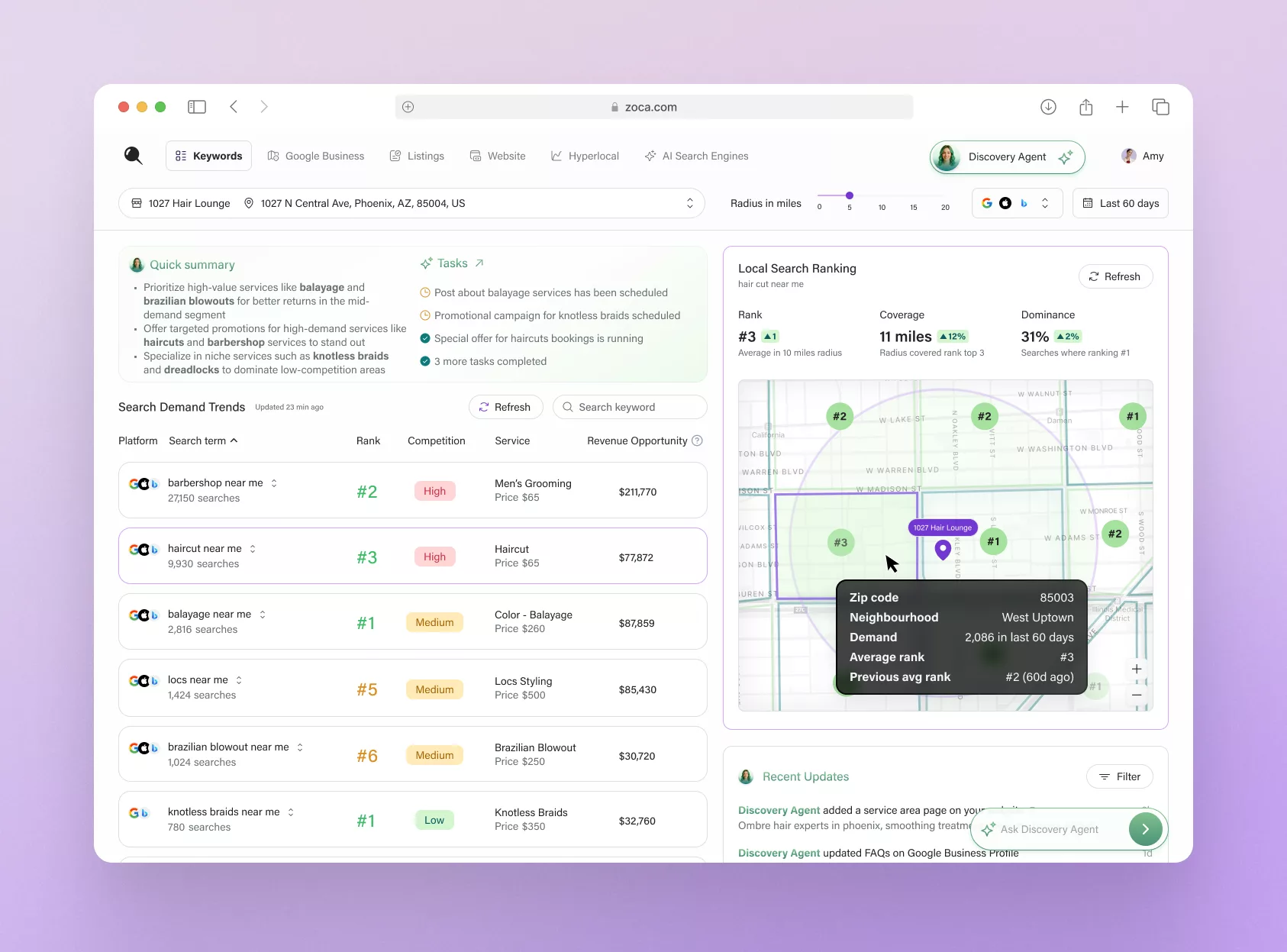
While competitors chase enterprise deals with eighteen-month sales cycles, Zoca onboards neighborhood salons in eighteen minutes.
The Agency Replacement Economics
Traditional marketing agencies charge $5,000 monthly minimum to deliver what Zoca’s AI provides for a fraction of the cost.
The value proposition: same outcomes, lower prices, zero human drama.
Zoca’s AI improves with every interaction while agencies just get more expensive.
Each booking generated by Zoca’s AI represents redistribution of digital privilege. A transfer of competitive advantage from those who can afford marketing agencies to those who cannot. When artificial intelligence begins serving the informal economy directly, it challenges assumptions about who gets to participate in technological progress and on whose terms.
There’s also a deeper irony at play.
The same AI capabilities that Silicon Valley positions as revolutionary have been repackaged here as simple business utilities. Zoca’s success suggests that AI’s highest impact might come from its most mundane applications.
The future of artificial intelligence may be decidedly unglamorous.
Global AI Development Strategy
Zoca’s success builds on a proven Indian playbook for global expansion.
First-generation vertical SaaS companies like Zenoti demonstrated how Indian startups could identify underserved markets worldwide and build specialized solutions that global competitors overlooked. Zenoti’s dominance in spa and salon management software proved that focusing on specific verticals, rather than horizontal solutions, could yield massive international success.
Zoca represents the next evolution of this strategy: extending the vertical SaaS playbook into an AI-first environment.
Where Zenoti provided management tools that still required human operation, Zoca offers autonomous AI agents that handle entire workflows. It’s the difference between giving someone better tools and giving them a team that never sleeps.
This progression suggests a distinctive approach for SaaS and AI development. One that prioritizes practical impact over theoretical capability, cultural sensitivity over technical elegance, specific solutions over general-purpose tools.
While global AI giants compete on benchmarks and parameter counts, startups like Zoca are writing a different playbook.
AI as cultural translator across markets. AI as an economic democratizer for small businesses worldwide. AI as an amplifier of existing human expertise rather than replacement.
This approach exposes a fundamental flaw in traditional startup thinking: the assumption that all markets are bound to be transformed or disrupted.
Sometimes the most valuable technology simply makes existing systems work better across different cultural contexts.
Zoca succeeded precisely because they resisted the urge to reinvent local commerce globally. They just made it more efficient everywhere.
Their roadmap includes predictive staffing tools to help owners optimize employee schedules based on historical and forecasted demand, and expansion into new verticals like dental practices, pet groomers, and personal trainers – anywhere professionals face the same time-based growth challenges.
The vision remains consistent: building the fundamental infrastructure for local businesses to thrive in an AI-first world, ensuring entrepreneurs never see an empty chair again.
This approach represents technological adaptation rather than technological imperialism: the patient work of making artificial intelligence speak local languages of value creation across diverse global markets.
The broader lesson extends beyond beauty services.
Take a massive, traditional sector that exists globally. Identify the core constraint that transcends geography. Build AI that removes that constraint completely. Skip the education phase and go straight to results, regardless of market location.
Scale and Execution
Every early-stage success story faces the same question: can this actually scale, or is it just an interesting regional phenomenon?
Zoca’s answer lies in their architecture. AI agents that learn neighborhood-specific patterns can theoretically learn any neighborhood’s patterns. The technology stack that works in Bangalore can work in the US, Europe, or Southeast Asia.
The fundamentals look solid across multiple markets. The customer needs exist globally. The unit economics work regardless of geography. The customer acquisition model scales internationally.
Their investors recognize the opportunity: Accel’s Manasi Shah notes the local services market spans $750 billion globally, while GTMfund’s Paul Irving observes that “these businesses are the cornerstones of their communities, but most are being left behind in a digital and AI-first world.”
This $6 million funding round, led by Accel with participation from GTMfund, Elevation Capital, and Better Capital, brings Zoca’s total funding to $8.8 million and reflects confidence in proven unit economics rather than theoretical market potential. As Elevation Capital’s Poorvi Vijay notes, “Zoca arms every neighbourhood business with a 24/7 AI growth engine.”
The Winner’s Test
The real test, however, lies in whether Zoca can maintain this simplicity while scaling across diverse global markets.
As they expand geographically and add features, the temptation to complexify will be enormous.
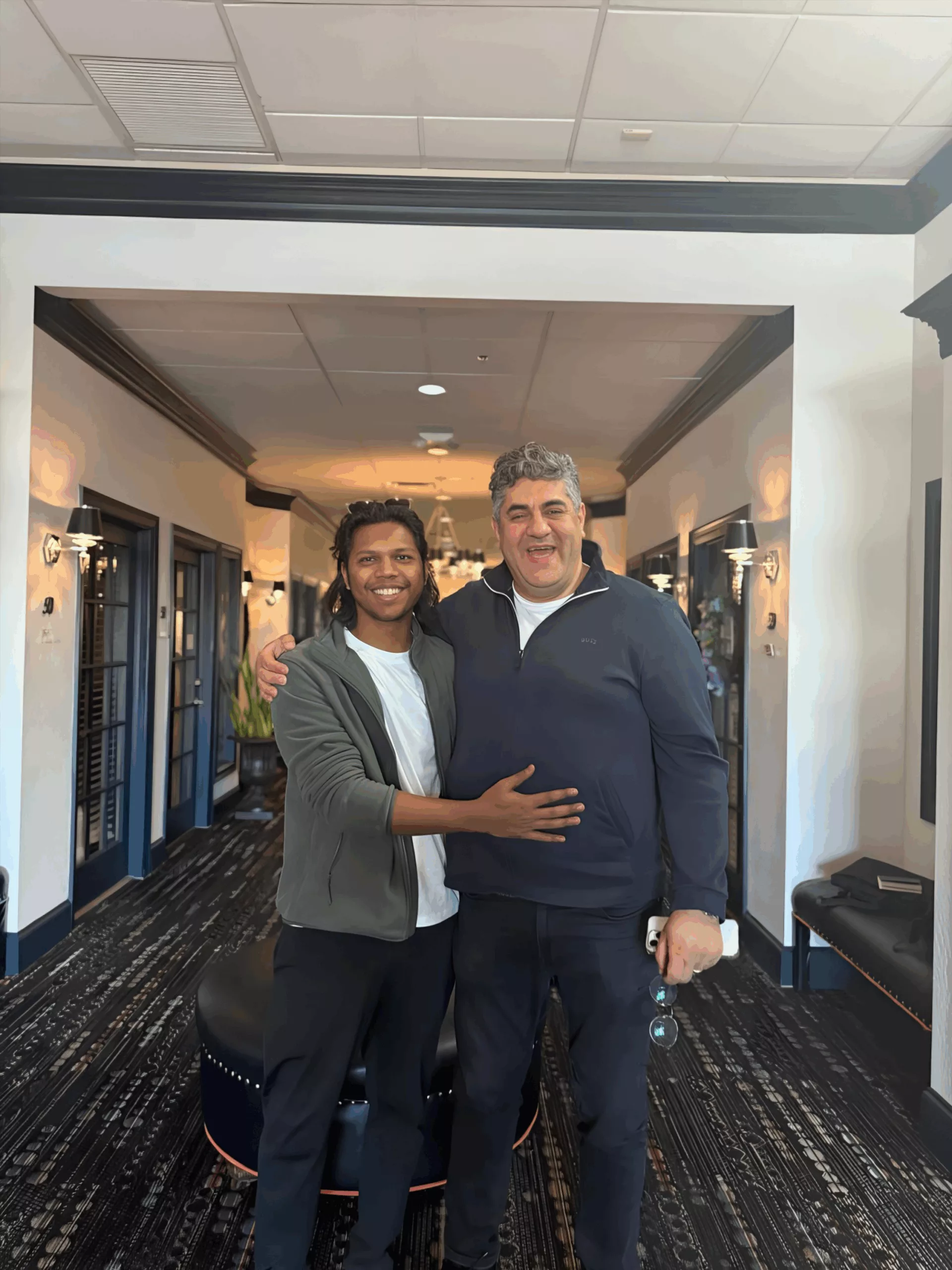
Every new market will bring requests for localization. Every investor meeting will include suggestions for additional revenue streams.
The startups that resist this feature creep while successfully adapting to local market nuances will dominate.
Those that succumb will become another cautionary tale about mission drift.
Zoca has achieved something rare in technology: innovation that improves lives by becoming invisible. Their AI agents work like good city planning. Noticeable only in their absence, valuable precisely because they don’t demand attention.
In an attention economy that rewards spectacle over substance, Zoca practices a different aesthetic: the beauty of systems that work. Their success story focuses on amplification, creating space for existing expertise to flourish.
The next wave of AI investments will prioritize usefulness over sophistication. Market dynamics don’t care about technical elegance. They care about whether customers pay their bills. This shift represents more than tactical repositioning. It signals the maturation of artificial intelligence from experimental technology to essential infrastructure that works across borders and cultures.
From the narrow lanes of Jayanagar, Bangalore to the strip malls of Phoenix, Zoca proves that artificial intelligence’s most radical proposition might be its most practical one: technology that simply works anywhere.
The companies that understand this global opportunity first will inherit the next decade.
About Advantage India
Advantage India chronicles the emergence of artificial intelligence that speaks in Indian vernaculars: technological innovation rooted in local contexts, solving local problems with global implications. This series explores market dynamics, emerging trends, and the pioneering journeys of AI-first startups, offering a profound lens into the evolving landscape of disruptive innovation. Explore more in this series here.













